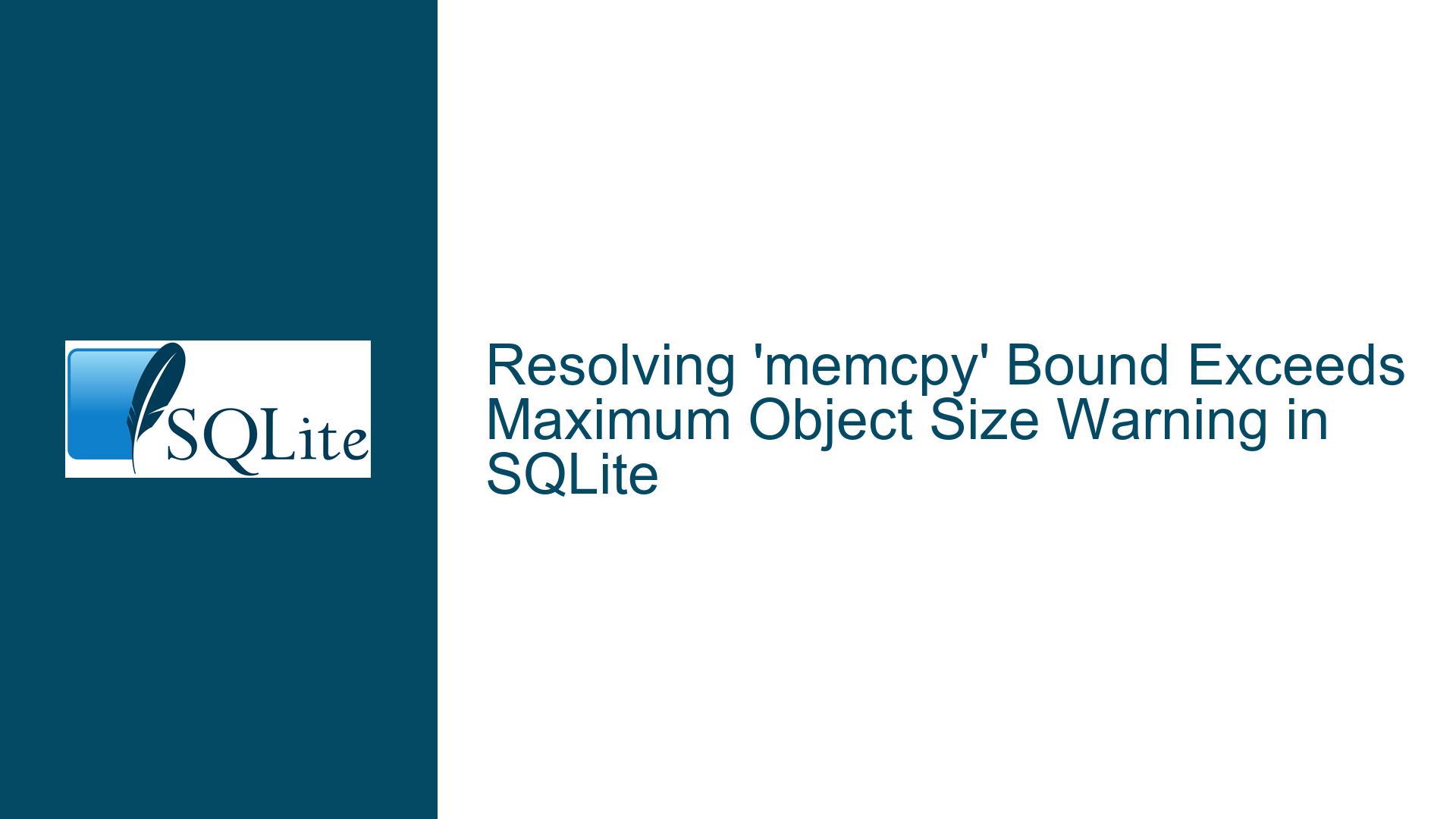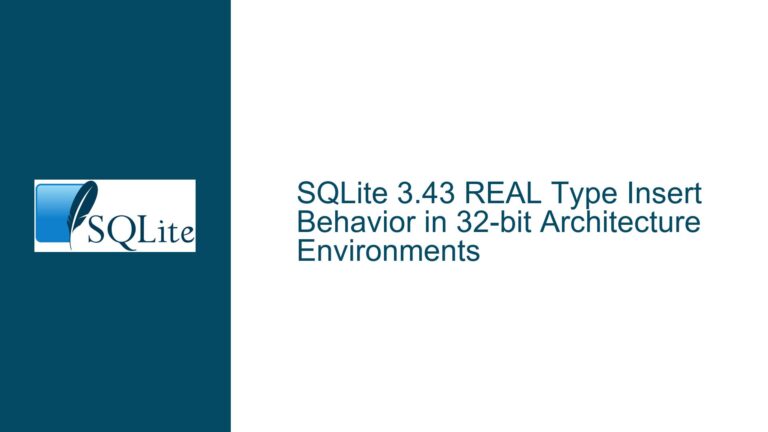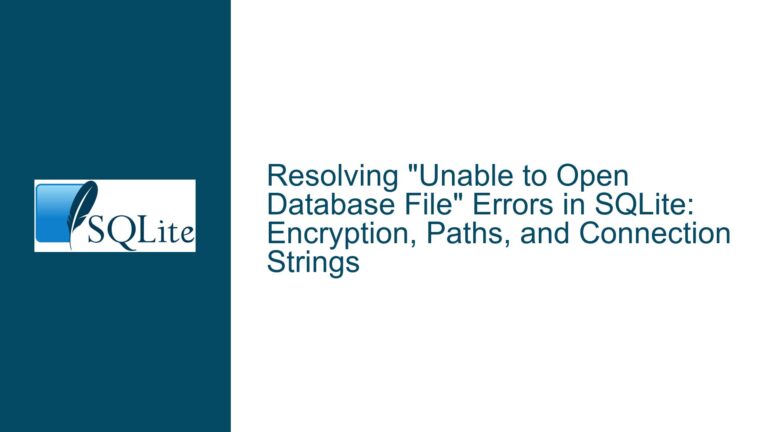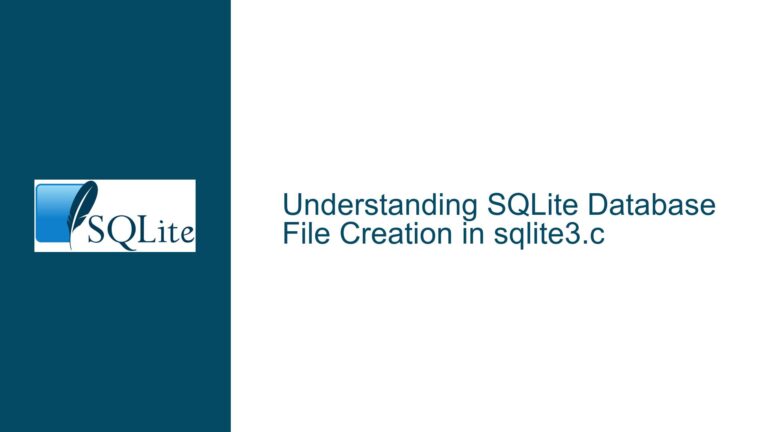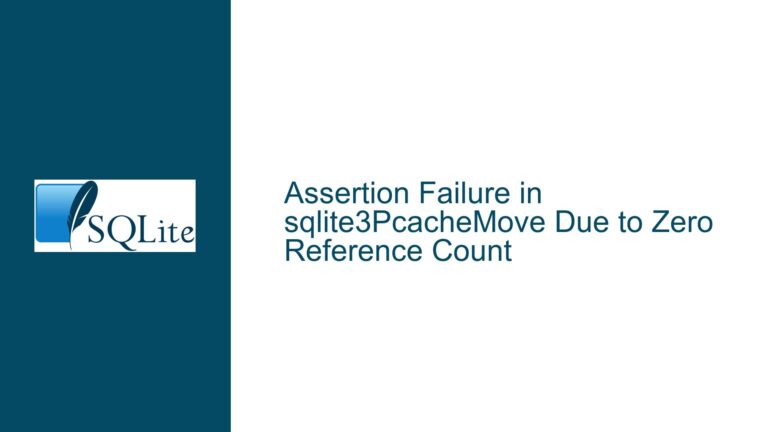Resolving ‘memcpy’ Bound Exceeds Maximum Object Size Warning in SQLite
Understanding the ‘memcpy’ Bound Exceeds Maximum Object Size Warning
The warning message 'memcpy' specified bound exceeds maximum object size is a critical compiler alert that arises during the compilation of SQLite, specifically within the sqlite3Fts5IndexQuery function. This warning indicates that the memcpy function is being instructed to copy a block of memory that exceeds the maximum allowable size for an object in the system. The warning is generated by the compiler when it detects that the size parameter passed to memcpy is larger than the maximum object size that the system can handle. In this case, the size parameter is 18446744073709551615, which is the maximum value for a 64-bit unsigned integer, and it exceeds the system’s maximum object size of 9223372036854775807, which is the maximum value for a 64-bit signed integer.
The memcpy function is a standard library function in C that copies a block of memory from one location to another. The function takes three arguments: a pointer to the destination memory block, a pointer to the source memory block, and the number of bytes to copy. The warning is triggered because the size parameter passed to memcpy is larger than the maximum object size that the system can handle. This can lead to undefined behavior, including memory corruption, crashes, or security vulnerabilities.
The warning is particularly concerning because it occurs in the sqlite3Fts5IndexQuery function, which is part of SQLite’s Full-Text Search (FTS5) module. The FTS5 module is responsible for providing full-text search capabilities to SQLite databases. The sqlite3Fts5IndexQuery function is used to query the FTS5 index, and it is critical for the proper functioning of the FTS5 module. If the memcpy function in this context is not handled correctly, it could lead to serious issues in the FTS5 module, including incorrect search results, database corruption, or even security vulnerabilities.
Exploring the Root Causes of the ‘memcpy’ Bound Warning
The root cause of the 'memcpy' specified bound exceeds maximum object size warning lies in the way the memcpy function is being used within the sqlite3Fts5IndexQuery function. The warning is triggered because the size parameter passed to memcpy is calculated in such a way that it can exceed the maximum object size that the system can handle. This can happen due to several reasons, including incorrect calculations of buffer sizes, improper handling of large data sets, or bugs in the code that lead to the generation of excessively large size values.
One possible cause of the issue is that the size parameter passed to memcpy is being calculated based on the size of a token in the FTS5 index. Tokens in the FTS5 index are typically small, but if the token size is incorrectly calculated or if the token itself is corrupted, it could lead to an excessively large size value being passed to memcpy. Another possible cause is that the buffer being copied into is not large enough to hold the data being copied, leading to an overflow condition. This could happen if the buffer size is not properly checked before the memcpy operation is performed.
Another potential cause of the issue is related to the way SQLite handles large data sets. SQLite is designed to be a lightweight database engine, and it is optimized for small to medium-sized data sets. However, when dealing with very large data sets, certain operations, such as memory copying, can become problematic. If the data set being processed by the FTS5 module is too large, it could lead to the generation of excessively large size values, which in turn could trigger the memcpy bound warning.
Additionally, the issue could be related to the specific version of SQLite being used. The warning was observed in a version of SQLite prior to version 3.38.0, which suggests that there may have been a bug or an oversight in the code that was later fixed in version 3.38.0. It is possible that the bug was related to the way the memcpy function was being used in the sqlite3Fts5IndexQuery function, and that the fix in version 3.38.0 addressed this issue.
Comprehensive Troubleshooting and Resolution Strategies
To resolve the 'memcpy' specified bound exceeds maximum object size warning, it is important to first identify the root cause of the issue. This can be done by carefully examining the code in the sqlite3Fts5IndexQuery function, particularly the section where the memcpy function is being called. The goal is to determine why the size parameter being passed to memcpy is exceeding the maximum object size, and to identify any potential bugs or issues in the code that could be causing this problem.
One approach to troubleshooting the issue is to add additional checks and safeguards in the code to ensure that the size parameter passed to memcpy does not exceed the maximum object size. This can be done by adding a check before the memcpy operation to verify that the size parameter is within acceptable limits. If the size parameter is found to be too large, the code can either truncate the size to a safe value or raise an error to indicate that the operation cannot be performed.
Another approach is to review the way the size parameter is being calculated in the sqlite3Fts5IndexQuery function. If the size parameter is being calculated based on the size of a token in the FTS5 index, it is important to ensure that the token size is being calculated correctly and that the token itself is not corrupted. This can be done by adding additional validation checks in the code to verify the integrity of the token before the size parameter is calculated.
If the issue is related to the way SQLite handles large data sets, it may be necessary to optimize the code to better handle large data sets. This could involve modifying the way memory is allocated and managed in the FTS5 module, or implementing additional checks to ensure that the size parameter passed to memcpy does not exceed the maximum object size. In some cases, it may be necessary to limit the size of the data set being processed by the FTS5 module to prevent the generation of excessively large size values.
Finally, if the issue is related to a bug in the specific version of SQLite being used, the best course of action is to upgrade to a newer version of SQLite that includes the fix for the issue. In this case, the warning was observed in a version of SQLite prior to version 3.38.0, and the issue was fixed in version 3.38.0. Therefore, upgrading to version 3.38.0 or later should resolve the issue.
In conclusion, the 'memcpy' specified bound exceeds maximum object size warning is a critical issue that can lead to serious problems in the SQLite FTS5 module. To resolve the issue, it is important to carefully examine the code in the sqlite3Fts5IndexQuery function, identify the root cause of the problem, and implement appropriate fixes. This may involve adding additional checks and safeguards in the code, optimizing the way large data sets are handled, or upgrading to a newer version of SQLite that includes the fix for the issue. By following these steps, the warning can be resolved, and the proper functioning of the SQLite FTS5 module can be ensured.
